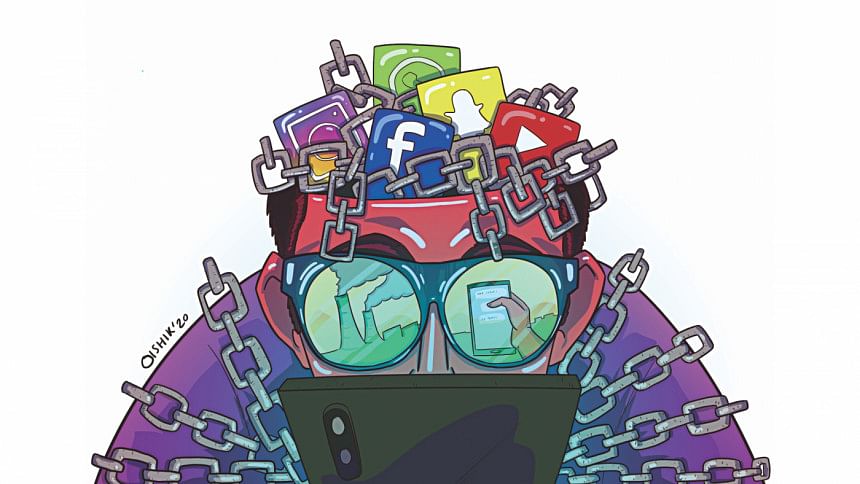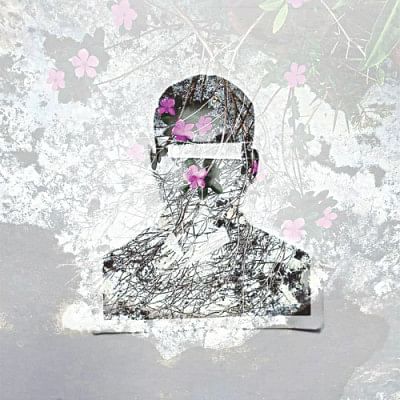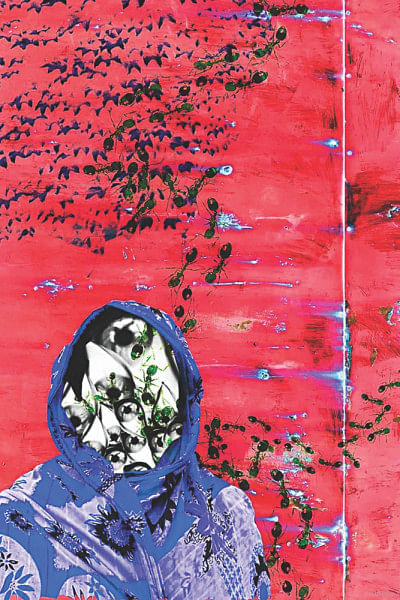The story of an anxious generation growing up in a fast-changing world

"Environment, climate crisis, Facebook, Instastories, Snapchat, social media influencers, relationships (lack thereof), and a world obsessed with being connected and updated constantly."
It may just seem like a string of words, but they happen to be some of the most pertinent worries that came up when I asked a bunch of young adults, aged between 20 to 26, what makes them anxious.
I asked them if they have ever sought help, and just how difficult it is to navigate a society that is always loaded up on information. It can sometimes be overwhelming to say the least, and is veering fast towards individualism. We talked about careers, relationships, therapists in Dhaka, the climate crisis and the subsequent eco-anxiety, and some more miscellaneous worries.
"I've been struggling with anxiety for a long time now, but I've learnt to handle it myself, as best as I can. I get anxious about everything, from having to introduce myself to new people in a meeting, to the impending doom of climate change," says 25-year-old Raha, who is growing up and building a career in Dhaka, a difficult city to live in. "I also get incredibly anxious when it comes to the future and the uncertainty of it. It's ridiculous because I'll sit and cry for hours about things I cannot control, like my loved ones dying someday. As for social media, it definitely makes things worse. Quite recently I got out of a six-month social media break, but I had to start using it again because of study and work purposes."
Raha is not alone in her worries. Kamal U A Chowdhury, an associate professor at the Department of Clinical Psychology at University of Dhaka, stated that more and more young adults and adolescents are coming to the university authorities with generalised anxieties about the current state of affairs, addictions, loneliness, and depression. Professor Kamal also offers therapy. He highlighted that young people in particular are having trouble with social media and the constant flow of information.
"The news on television makes me feel terrible. There's even more upsetting information on social media, which can be very triggering. For instance, rape cases and stories
of abuse make me feel angry and paranoid, thinking about how cruel people can be. Even the news reports on Australia's bushfires and the animals were incredibly upsetting," shares Raha.
But it is not just about the content that social media and the news bombards us with. There are also certain expectations of how we are to behave and be on social media. It is as though we are maintaining a separate digital media presence, while living through our daily lives, which can be exhausting for many.
"People's obsession with social media makes me incredibly anxious. I feel suffocated by how much I am required to pose for pictures all the time, but also always be mindful of how I behave, lest it reaches my family, because people are nosy and it might hurt their sentiments. There are just a lot of extra thoughts that go behind clicking a photograph, something that was missing when I was a teenager," says Shayera, a 27-year-old journalist starting out in the Bangladeshi publishing industry.
Experts in Bangladesh who are working in the mental health industry are often times ill-equipped to handle the complaints of heavy internet use, teetering very close to addiction.

Professor Kamal believes that the only way to deal with this issue is to intervene early, and these interventions need to come from family. He also stressed that it is important to teach the youth to navigate social media and the world wide web, so that it is not detrimental to their health. "It's not possible to come up with one solution that fits all. Rather, we should focus on training and developing the pool of mental health service providers," he explains.
While it is important to monitor and sometimes even purge the internet, many have luckily found ways to cope with this issue. Nasifa, 25, a freelance film critic and a full-time marketer, says she has slowly learned how to deal with the excess of information. She now uses the various platforms to engage with other film aficionados and to discuss cinema, art and theatre.
"I use social media to keep in touch with other professionals in my field, who I genuinely connect with, for news updates and intellectual discussions and to just communicate with the film and cinema community. I don't follow people that I don't like, and I mute people whose posts bother me," she adds. "I am also very comfortable blocking toxic individuals from my social media, and I regularly maintain offline periods when I deactivate some of my social media accounts."
Similarly, Raha feels that social media is a necessary tool for the greater good. "Nobody should have to filter out their posts because of how I feel. There are ways to adjust your settings— unfollow people and hide some posts," she says. "I unfollowed 500 people at once. Also, memes act as life savers for me. I get relatable and inspirational content and I'm able to laugh at my own misery, because of memes. They're the best part of social media right now."
Twenty-three year old Rahman, currently in graduate school away from home, highlighted yet another aspect of social media.
"Sometimes I feel that I am missing out on so much of my friends' lives, but I don't want to unfollow them either, because they are close to me," he says. "But life is happening separately to all of us, yet, we are somehow a part of it all, from a distance. It all just seems too
confusing for me sometimes, balancing the 'here and now' with the 'there and now'."
Most of the respondents are unanimous in their worries for the environment. In addition to personal troubles, they are angry and frightened at how current and past world affairs have threatened the very existence of our planet.
"My whole family lives in Bangladesh and I am gripped by the fear that most of it will go underwater in less than a quarter of a century. When you are from a developing country, it feels especially unfair to see just how much we will have to suffer, thanks to the rampant exploitation," laments Rahman.
"I may not worry about the environment on a daily basis, which makes me worry just a little bit more—the fact that we are just sitting back and letting our planet go to ruins and one day, it will hit us. I mean, it is already happening, and we are complicit in this crime," adds Shayera.

The ongoing climate crisis has also given rise to a growing disenchantment with the current political and gig economy culture, that chips away at any sense of community and only promotes individualism. This has affected everything from our jobs to lifestyles to the environment, even the very fabric of our relationships.
"Relationships are one of the primary matters attacked by capitalism, erodes communities and pushes people towards individualism, which then feeds consumerism. Alienation, in my opinion, is one of the biggest problems of our generation. Tech corporations profit off of our isolation," says Nasifa.
So, under such circumstances, when young adults are plagued by different anxieties, how do they feel about therapy?
Skepticism seems to be the norm when it comes to mental health assistance in Dhaka. "I've never been to a therapist and I don't think I'm going to go anytime soon. I cannot really tell my parents about this, and I've also heard many strange stories," says Raha. "For instance, my friend went to a therapist who ended up calling her mother, and was trying to manipulate her. Thankfully, my friend's mom informed her. This may not be how all therapists work, but I can't make myself do it. It takes a lot of courage to go to therapy, and I don't have that right now. Sharing my thoughts is very intimate and scary for me, and I cannot do it with the wrong person."
Shayera pointed out how everyone seems to know everyone in Dhaka and gossip, especially about something as sensitive as mental health, spreads like wildfire in the city. This makes it especially hard for many to open up about their issues.
"Dhaka therapists are not that cooperative, and neither are therapists abroad. My therapist was pushing me towards individualism and really did not understand the cultural context I was coming from," says Nasifa.
Rahman explained that therapists often take a very bookish approach to diagnosis. "Their method is very prescriptive. It makes the people seeking therapy feel as though their anxieties are simply a brain dysfunction and that they do not stem from other factors, such as socioeconomic issues, class warfare, and other very real matters."
In addition to the failure in communication, Professor Kamal believes that there is a dearth in the very number of therapists, psychiatrists, psychologists, and mental health counsellors in the country.
"Dhaka may have a few counsellors to offer now. There are few in Chattogram, Rajshahi, and Sylhet, but apart from the well-known hospitals, regular mental health therapy services are severely restricted," he says.
There is much that needs to be done in terms of access to mental health services and how we approach different mental health issues. The conversations recounted in this story are a reminder that we still have a long way to go. I asked some of the respondents what makes them feel better in the interim. While we were all on social media, they shared several memes with me to lighten the mood, and I promise you, they did not disappoint. I will go and scroll through some memes now to take my mind off of my worries. Perhaps you should too.

 For all latest news, follow The Daily Star's Google News channel.
For all latest news, follow The Daily Star's Google News channel. 



Comments